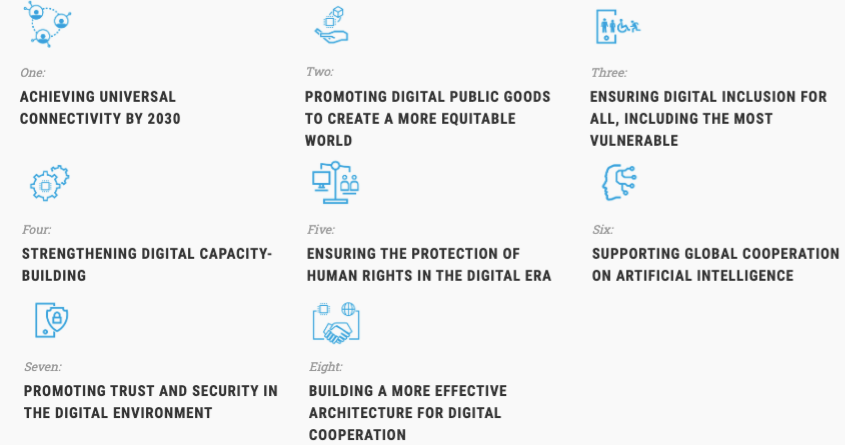On Thursday 13 June, the UN Secretary-General launched the Roadmap for Digital Cooperation. Following the work from the High-level Panel on Digital Cooperation established in 2018, his remarks and this roadmap has been introduced to the international community at an incredibly significant juncture. The dangers in digital divides, long-standing inequalities, misinformation, and hate speech have again been demonstrated and significantly accentuated through a global pandemic. Carolina Rossini, Portulans co-founder and CEO, joined the second day of events as a discussant.

Portulans Institute Board Member Lynn St. Amour served as the Chair of the United Nations Internet Governance Forum’s Multistakeholder Advisory Group from 2016 – 2019 and has been a part of these Digital Cooperation efforts since the earliest days, “the Roadmap and its precursors present an opportunity to the global community to advance effective, collaborative policies and practices for global digital cooperation; one that incorporates the best of multilateral practices while instituting tried and tested multistakeholder approaches, as evidenced by forums such as the Internet Governance Forum (IGF) or the Global Commission on the Stability of Cyberspace (GCSC), to name only a few.”
As commented by UN Secretary-General Antonio Guterres in his opening remarks, the international community is currently facing an unprecedented multitude of digital challenges and has reached a “critical inflection point for technology governance.” Technology brings immense opportunities for improving global lives and livelihoods. Yet Guterres was clear that if we fail to harness these technologies and use them for the good of all, they will soon become obstacles to cooperation and the development of nations. The rise of disinformation and hate speech in the same online spaces that hold great promise is a case in point, as well as a lack of diversity in AI. The risk, Guterres stated, is not that we go too far. Rather, the risk is that we don’t go far enough to embrace digital cooperation.
To support this work moving forward, the UNSG plans to appoint a Technology Envoy, in order to advise the UN on emerging trends and threats. The Envoy will serve as a platform for multi-stakeholder communication. It will also track technology’s impact on the UN’s other action areas, such as peacekeeping. In our perspective, the UN’s Roadmap is part of a wider trend in the international policy-making community to place digital at the core of COVID-19 recovery and building network-ready, resilient global economies. A similar example is the EU’s latest COVID-19 recovery package, which also places digital at its core (see our analysis in this blog).
While advancing digital technologies offer many opportunities to benefit civilization, they will likely also disrupt life as we know it. Portulans applauds these efforts to focus the global conversation on cooperative and trusting digital futures and looks forward to actively participating in the conversation with well-informed, data-driven assessment tools, and analysis. The Roadmap’s eight focus areas are opportunities for meaningful, multi-stakeholder joint action. These are Portulans’ initial thoughts and contributions in support of this effort.
Global Connectivity and Digital Inclusion
While connectivity and inclusion are not new goals for the international community, speakers from across the public and private sectors were unanimous in their diagnosis that unequal connectivity is an obstacle to inclusive development and nations’ economic growth. Sir Tim Berners-Lee noted that approximately 3.5 billion people are excluded from the recent leaps and bounds in global connectivity. This connectivity gap is captured by the Network Readiness Index, developed by Portulans Institute co-founders, and until 2016 published by the WEF. Recognizing that connectivity is about more than access, the NRI measures technology readiness in Access, Content, and Future Technology. The world’s highest-ranking countries in this index (Sweden, Singapore, and the Netherlands) are committed to policymaking that ensures connectivity for all. Additionally, the Alliance for Affordable Internet (part of Berners-Lee’s organization, Web We Want) has launched the Meaningful Connectivity Standards, setting a higher standard for the type of connectivity that must be achieved.
On the topic of COVID-19 and meaningful connectivity, Director of the A4AI Sonia Jorge stated that we measure Internet access with a simple binary: “online or offline… However, as the current pandemic has made clear, basic internet access is not enough. To close this persistent digital divide in access and use, and make transformative progress in global connectivity, we need to look beyond this basic access and make sure people can use the full power of the internet.” Learning from these assessments and models will promote the achievement of universal, safe, and affordable Internet access by 2030.
President Simonetta Sommaruga (Switzerland) noted that even in advanced economies, digital inclusion is not guaranteed for all. In Switzerland’s own national experience during COVID-19, many children were excluded from online schooling. Vodafone CEO Nick Read focused his opening remarks on digital infrastructure, and underlined the fact that COVID-19 recovery should focus on building digital resilience in the public and private sector. Both President Julius Madaa Bio (Sierra Leone) and World Economic Forum Chairman Klaus Schwab noted that another key area of digital inclusion is providing safe and privacy-respecting digital identification for over one billion undocumented individuals globally.
The Roadmap also encourages the development of annual scorecards on digital inclusion, in addition to the development of metrics to measure digital inclusion and literacy. In addition to Portulans’ NRI, which for almost two decades has provided tools for gauging Individual, Business and Government network readiness, the Global Innovation Index, created by Portulans Institute co-founders and published by World Intellectual Property Organization is a leading assessment tool for measuring a country’s innovation performance, encompassing the political environment as well as education, infrastructure, skills, and business and market sophistication. Both provide the necessary data for the aforementioned scorecards, and furthermore, link connectivity with improvement in other areas of society and the market.
Digital Public Goods
The roadmap also emphasizes the overwhelming importance of building a multi-stakeholder alliance to share digital public goods. The incoming Chairman of the International Chamber of Commerce Ajay Banga noted that now is the time to focus on protecting the entire global digital ecosystem, and not just discrete parts. Building a platform for sharing digital public goods is a critical step to “[unlock] the full potential of digital technologies and data to attain the Sustainable Development Goals.” As the report notes, it is critical that all actors champion open-source software, open AI models, open standards, open data and other open content. To this end, Portulans is thrilled to announce its increasing focus on building AI skills and promoting open data for innovation.
Digital Capacity-Building
UN High Representative for the Least Developed Countries, Landlocked Developing Countries, and Small Island Developing States Fekitamoeloa ‘Utoikamanu commented that digital technology lies at the core of building and participating in the global value chain. Facing former ?? exclusion from this value chain, least developed countries should harness digital technologies to turn this challenge into an opportunity for meaningful participation. Under our talent for competitiveness focus area, Portulans developed an analysis that found that locally-driven and internationally-supported digital capacity-building has the power to recover and contribute to inclusive development in the years ahead.
Digital Human Rights
Baroness Joanna Shield of WeProtect and BenevolentAI focused her remarks on the protection of children in digital spaces: an existing challenge exacerbated by the climate of COVID-19. Baroness Shields called for policy action on digital human rights with a particular focus on children’s rights. “Technology fused with human intelligence and compassion can help transform society to renew and remake the world.” As commented by Portulans co-founder and CEO Carolina Rossini at the Roadmap launch, the countries leading the NRI, GII, and Global Talent Competitiveness Index are countries with better track records in digital human rights.
Artificial Intelligence
As head of the AI and Society program at CIFAR Rebecca Finlay noted, deployed with “responsibility”, AI technologies have the power to enhance society. The international community has a responsibility to ensure the deployment and use of AI is sustainable and promotes peace, human rights, and safety. For that, the international community also has the responsibility to invest in the right AI skills for talent, as commented by Portulans co-founder Bruno Lanvin.
Digital Trust and Security
The digital technologies that underpin society’s core infrastructure (including supporting access to food, water, housing, energy, health care and transportation) and government services (including Digital ID systems), need to be safeguarded. This UN focus area is the result of a long-term push by Secretary-General Guterres for a global commitment to digital stability.

Looking Ahead
Portulans celebrates the prioritization of digital governance and its confident inclusion in the UN’s approach to solving global issues. “A significant part of Portulans Mission is to inform policy-makers, by producing independent, rigorous metrics and data-based research and developing cross-community knowledge to contribute to sustainable and inclusive growth“, says St.Amour, “and I believe the UN Roadmap presents a timely and critical opportunity. The time is now and we must all be ambitious”.




